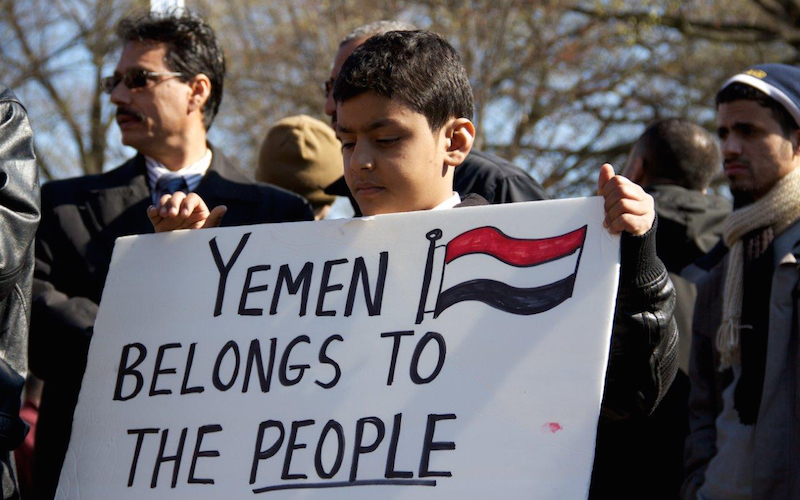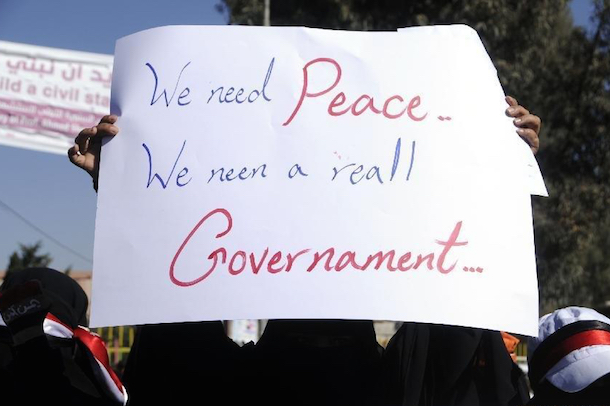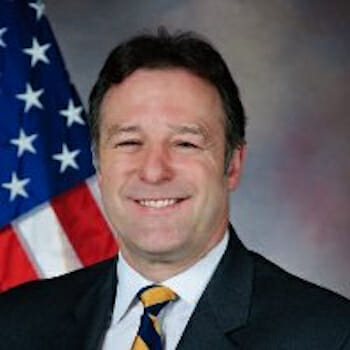
Yemen’s New Youth Revolution
Thousands of Yemeni youth are protesting against the Houthi militia in Sana’a. The Houthis have tightened their grip on the capital and other cities across the Western swathe of Yemen. The protest started on 24 January just two days after President Hadi, a key American ally in the fight against Al-Qaeda on the Arabian Peninsula (AQAP), tendered his resignation along with Prime Minister Bahah. President Hadi said that he could no longer stay in office as the country is deadlocked. According to Dr. Jamal Benomar – the United Nations Special Envoy to Yemen – Hadi is under house arrest, as is the Prime Minister and other members of the Government. What is happening?
Over the past few days, thousands of Yemenis have taken to the streets, using Sana’a University as their embarking point, for peaceful protest marches to President Hadi’s home. They chant as they march denouncing both the Houthis and also AQAP. The Houthis forcibly cracked down on the protesters to frighten them into quitting. Fifteen students were reportedly kidnapped yet subsequently released. The next day, the Houthis – supported by Yemeni security forces – closed the gates of Sana’a University in order to prevent another angry mob from joining the initial group amassing at Change Square.
According to media, a further eight youth were arrested and only five of them have been subsequently released. On 28 January the Houthis shot live rounds into the air to disperse the protesters; there were thousands marching to Hadi’s house. Others, including journalists, were reportedly injured during the protests.
Until now the Houthis seem unwilling to kill to prevent the protests, but their actions are very reminiscent of the regime of former President Ali Abdullah Saleh who also replaced government institutions and used force to oppress opposition and prevent both freedom of speech and assembly. Arresting and kidnapping protesters is now a daily event.
Yemen’s newest youth revolution is demanding that the Houthis use politics not violence to secure their place in Yemen’s new government, despite their attempted coup. Negotiations with major parties have been ongoing behind-the-scenes for almost four days now but it seems that the groups cannot reach an agreement; some have withdrawn and others are talking about a stalemate. The southern movement demands that the negotiations move to Taiz claiming that the existing process is being conducted under duress based on the armed presence of Houth rebels. They also demand the immediate release of President Hadi.

While the Houthis want to form a presidential committee, Saleh’s General People’s Congress party demands an appeal to the Parliament to determine if Hadi’s resignation will be accepted. Protests are now spreading to other cities across the country as the unrest grows. Some protesters in the south have already declared their rejection of Sana’a rule and chosen separation.
The recent engagement of the United Nations and the international community has helped uplift Yemeni spirits. Many worry that the United States is only interested in fighting AQAP, despite the valiant, steadfast and role model efforts of American Ambassador Mathew Tueller who is standing firm in his Embassy in Sana’a and refusing to be evacuated. The American press is worried about the Ambassador’s safety. Recently Secretary of State John Kerry denied any cooperation with the Houthis.
The international community, through the Gulf Cooperation Council, sponsored a legally and morally binding process and implementation mechanism to ensure Yemeni peace. It eased Saleh from office following the first youth revolution, the so-called Arab Spring protests, of 2011. From that deal emerged the National Dialogue Conference and a subsequent road map for the future. The situation in the country is both fluid and uncertain. The resignation of President Hadi without a negotiated settlement will plunge the country into chaos and the power vacuum which follows will likely further destabilize and lead to all-out conflict.
The Gulf States and international community should remember that Yemen’s ungoverned spaces are already a nest of extremist vipers and any further collapse of the state will just lead to more space in which AQAP can operate. A deal must be reached which allows President Hadi to continue to govern so he can discharge his responsibilities within the agreed process and implementation mechanism, so Yemen may move quickly to a referendum on the new Constitution, followed by Parliamentary and Presidential elections. Anything less is just a sham, illegal, and shame on the Houthis for taking up arms.
Yemen is the case study of humanitarian crisis. It is one of the poorest countries in the world and half of its people are already living beneath the poverty line. Conflict will only make things worse. It is time for the “big wigs to pull the iron from the fire.”


